As a hiring manager, finding the right Java developer is paramount to your company's success in tech-driven projects. Companies often struggle to identify the right candidate because they overlook critical skills and qualifications specific to Java development. A high-performing Java developer should have a grasp on modern frameworks, proficiency in Java language fundamentals, and the ability to integrate seamlessly with your team dynamics.
In this article, we will explore strategies to identify and engage the best Java developers. We'll cover each stage of the hiring process, from resume screening and skill assessments to the interview structure, ensuring a comprehensive understanding of what it takes to hire the right Java talent. For more on assessment tools, check out our skills assessment tests.
Table of contents
Why hire a Java Developer?
Hiring a Java Developer can help solve critical business challenges related to software development and maintenance. For instance, if your company is struggling with slow application performance or needs to modernize legacy systems, a skilled Java Developer can address these issues effectively.
Consider hiring a Java Developer when:
- You're planning to build large-scale enterprise applications
- Your existing Java-based systems need optimization or upgrades
- You want to develop cross-platform mobile applications
Before committing to a full-time hire, assess your project scope and duration. For short-term needs or specific projects, hiring a consultant might be more cost-effective. For ongoing development and maintenance, bringing a full-time Java Developer on board is often the better choice.
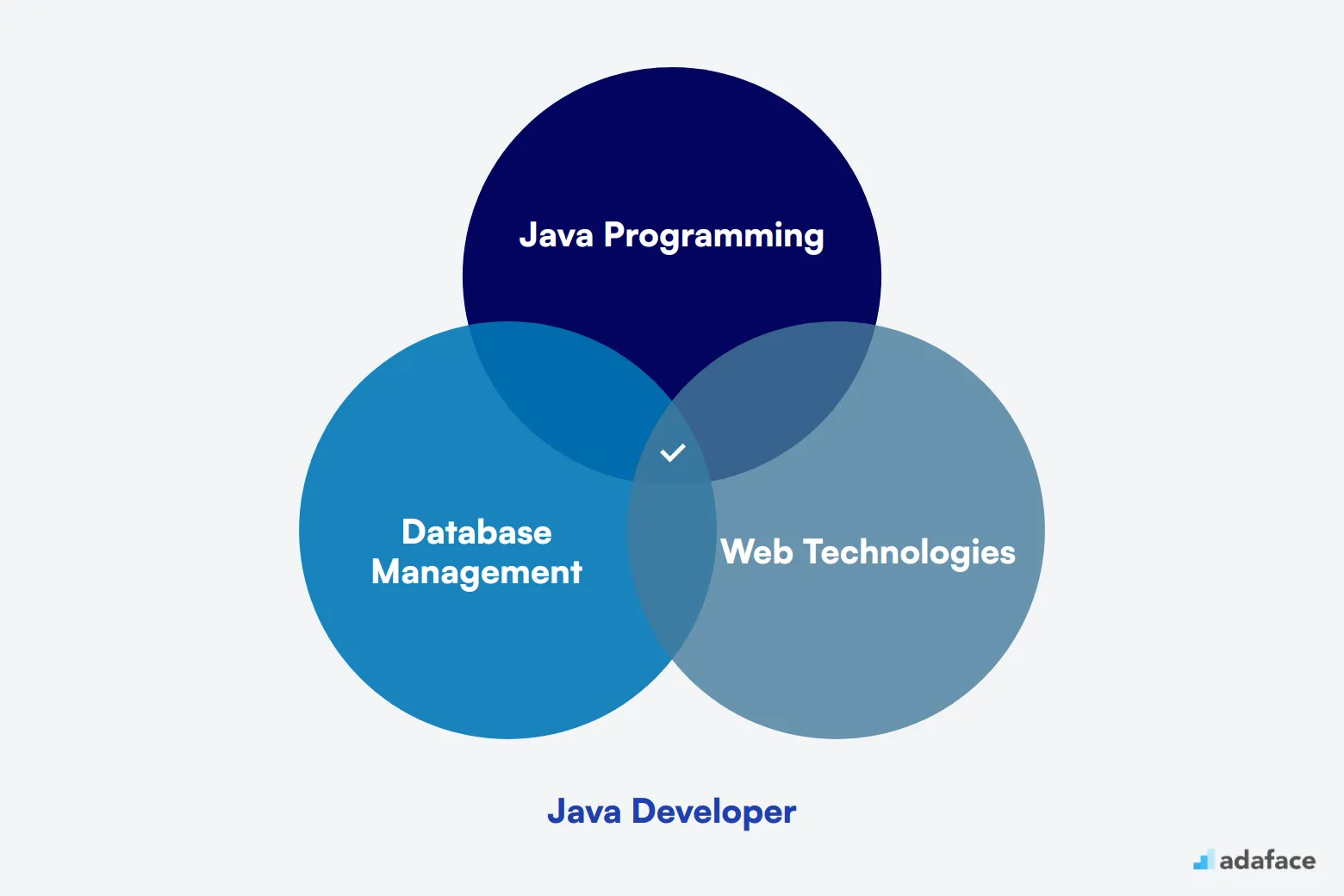
Java Developer Hiring Process
The hiring process for a Java Developer typically takes about 4-8 weeks. Below are the key steps to guide you through this timeline.
- Define the job role: Start by crafting a clear and detailed job description that outlines the required skills and responsibilities. Posting this on relevant job boards is essential for attracting candidates.
- Collect resumes: Expect to receive applications within 1-2 weeks after posting the job. This will give you an initial pool of candidates to evaluate.
- Shortlist candidates: Review resumes and shortlist candidates who meet the qualifications. This step should take around a week.
- Conduct skill assessments: After shortlisting, have candidates complete coding tests or assessments relevant to Java development. Allocate about a week to collect and analyze results.
- Interview processes: Schedule interviews with top candidates to further gauge their technical skills and cultural fit. This phase often takes 1-2 weeks.
- Make an offer: Once you identify the best candidate, extend a job offer. This can take a few days to finalize depending on negotiations.
In summary, the Java Developer hiring process is a structured timeline that usually spans 1-2 months. By following these steps, you can streamline your efforts and enhance your chances of finding the right fit. We will now explore each step in detail, providing checklists and additional resources.
Key Skills and Qualifications for Hiring a Java Developer
Creating a candidate profile for a Java Developer can be tricky, especially when you're not clear on what skills are strictly necessary versus what would be a nice-to-have. It's important to distinguish between required and preferred qualifications to attract the right talent. This clarity not only streamlines the selection process but also helps avoid common hiring pitfalls.
Here are the required skills you should look for when hiring a Java Developer:
- Proven experience with Java development, including familiarity with Java SE and Java EE
- Strong understanding of object-oriented programming principles
- Experience with version control systems, such as Git
- Bachelor's degree in Computer Science, Software Engineering, or a related field
- Good knowledge of relational databases, SQL, and ORM technologies
In addition to the required skills, consider these preferred qualifications that can enhance a candidate’s profile:
- Experience with front-end technologies like HTML, CSS, and JavaScript
- Familiarity with cloud platforms such as AWS or Azure
- Knowledge of RESTful APIs and microservices architecture
- Experience with Agile and Scrum methodologies
- Familiarity with Java frameworks such as Spring or Hibernate
| Required skills and qualifications | Preferred skills and qualifications |
|---|---|
| Proven experience with Java development, including familiarity with Java SE and Java EE | Experience with front-end technologies like HTML, CSS, and JavaScript |
| Strong understanding of object-oriented programming principles | Familiarity with cloud platforms such as AWS or Azure |
| Experience with version control systems, such as Git | Knowledge of RESTful APIs and microservices architecture |
| Bachelor's degree in Computer Science, Software Engineering, or a related field | Experience with Agile and Scrum methodologies |
| Good knowledge of relational databases, SQL, and ORM technologies | Familiarity with Java frameworks such as Spring or Hibernate |
How to write a Java Developer job description?
Once you have a candidate profile ready, the next step is to capture that information in the job description to attract the right candidates. A well-crafted job description can set the tone for the entire hiring process.
• Highlight key responsibilities and impact: Clearly outline the specific tasks the Java Developer will be responsible for, such as developing applications or collaborating with cross-functional teams. This helps candidates understand their role's importance in the organization.
• Balance technical skills with soft skills: While it's crucial to list technical requirements like Java proficiency and experience with frameworks like Spring, don’t forget to highlight the need for effective communication and teamwork. This attracts candidates who can thrive in a collaborative environment.
• Showcase unique selling points: Mention what sets your company apart, whether it's a commitment to innovation, flexible work arrangements, or opportunities for professional development. This information can entice top Java talent to apply for your position.
10 Platforms to Hire Java Developers
Once you have a well-defined job description, the next step is to post it on job listing sites to attract talented Java developers. The right platform can make a significant difference in reaching diverse candidates and streamlining the hiring process. Below, we showcase some top platforms to help you find the perfect Java developer for your team.
Ideal for finding and hiring full-time Java developers due to its extensive network of professionals and job posting features.

Indeed
One of the largest job search engines, suitable for listing full-time Java developer positions with a wide reach.

Upwork
Perfect for hiring freelance Java developers, offering a vast pool of freelance professionals ready to take on short-term projects.

Beyond these top platforms, many other options are worth considering when hiring Java developers. Glassdoor and Monster provide insights and wide reach, making them ideal for full-time positions. Toptal offers top-tier freelance talent for critical projects, while AngelList is perfect for startups. Specialized tech platforms like Dice and Stack Overflow Jobs cater specifically to tech-savvy audiences. Finally, Upwork and Freelancer offer flexible freelance hiring options that are popular among recruiters. To explore more on hiring, visit our how to hire guide.
Keywords to Look for in Java Developer Resumes
Resume screening is the first step in finding the right Java developer. It helps you quickly filter out unqualified candidates and focus on those with the most potential.
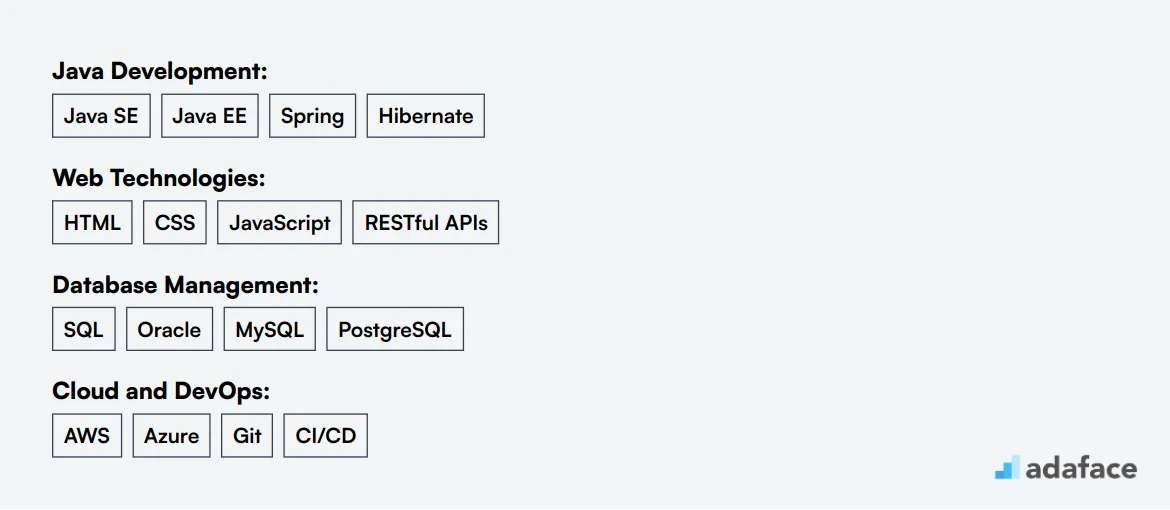
When manually screening resumes, look for key technical skills like Java SE, Java EE, Spring, and Hibernate. Also, keep an eye out for experience with databases, SQL, and ORM technologies. This approach allows you to shortlist candidates who match your skills requirements for Java developers.
AI tools can streamline the screening process. You can use ChatGPT or similar AI to analyze resumes based on your specific criteria. This saves time and ensures a consistent evaluation of all applicants.
Here's a sample prompt for AI resume screening:
TASK: Screen resumes for Java developer role
INPUT: Resumes
OUTPUT: For each resume, provide:
- Email and Name
- Matching keywords
- Score (out of 10)
- Recommendation
- Shortlist (Yes/No/Maybe)
KEYWORDS:
- Java (JDBC, OOPs, API)
- Frameworks (Spring, Hibernate)
- Database (SQL, ORM, Query Optimization)
- [Web Technologies](https://www.adaface.com/assessment-test/full-stack-developer-test) (HTML, CSS, JavaScript)
Recommended Skills Tests to Screen Java Developers
When hiring Java developers, skills tests are a straightforward way to assess a candidate's abilities beyond their resumes. With the right tests, recruiters can ensure that candidates possess the necessary technical skills for the role.
The Java skills test is a direct approach to determine if candidates can handle Java programming tasks effectively. This test evaluates their knowledge of syntax, object-oriented programming concepts, and common Java libraries.
To ensure candidates are adept in enterprise Java development, consider the Java Spring Hibernate Test. This test assesses their ability to work with the Spring framework and Hibernate, which are frequently used in building scalable enterprise applications.
The SQL Online Test is recommended for Java developers who need to interact with databases. This test checks their understanding of SQL queries, data manipulation, and database design, which are integral for backend development.
For those roles where Java is used in combination with other technologies, the Java Spring SQL Test provides a mixed evaluation. It checks the candidate's skills in both Java Spring and SQL, ensuring a well-rounded understanding of building and managing enterprise applications.
Lastly, consider the Coding and Data Structures Arrays Test to assess problem-solving skills and algorithmic thinking. This test evaluates candidates on their ability to write efficient code and manipulate data structures, which is a key skill for any Java developer.
How to structure interview stage for hiring Java Developers
After candidates pass the initial skills tests, the next step is conducting technical interviews to test their hard skills. Skills tests are great for filtering out unfit candidates, but technical interviews help identify those best suited for the role. This stage involves evaluating their problem-solving abilities and depth of knowledge in Java and related technologies.
Here are some questions you might consider asking:
- Can you explain the difference between Java 8 features like lambda expressions and streams? Java 8 Interview Questions.
- How do you manage exception handling in Java, and why is it important?
- What are the advantages of using the Spring Framework in Java applications?
- Explain how you would implement a REST API using Java technologies.
- Can you discuss the role of hibernate in database management? These questions help assess a candidate's proficiency in specific Java technologies and concepts.
How much does it cost to hire a Java Developer?
The cost of hiring a Java Developer varies significantly across countries and regions. In the United States, salaries range from $67,837 to $183,694, with a median of $111,630. India offers more budget-friendly options, with annual salaries averaging ₹772,354.
In the Philippines, Java Developer salaries fall between ₱183,883 and ₱1,175,081 per year. These figures provide a general guideline, but remember that factors like experience, specific skills, and location can greatly influence the final cost.
Java Developer Salary in the United States
Java Developers in the United States earn competitive salaries. According to our data, the average salary ranges from $67,837 to $183,694, with a median of $111,630.
Location plays a big role in salary variations. For instance, New York, NY offers the highest median salary at $122,733, while Austin, TX has a lower median of $91,890. These figures can help recruiters set competitive offers based on location.
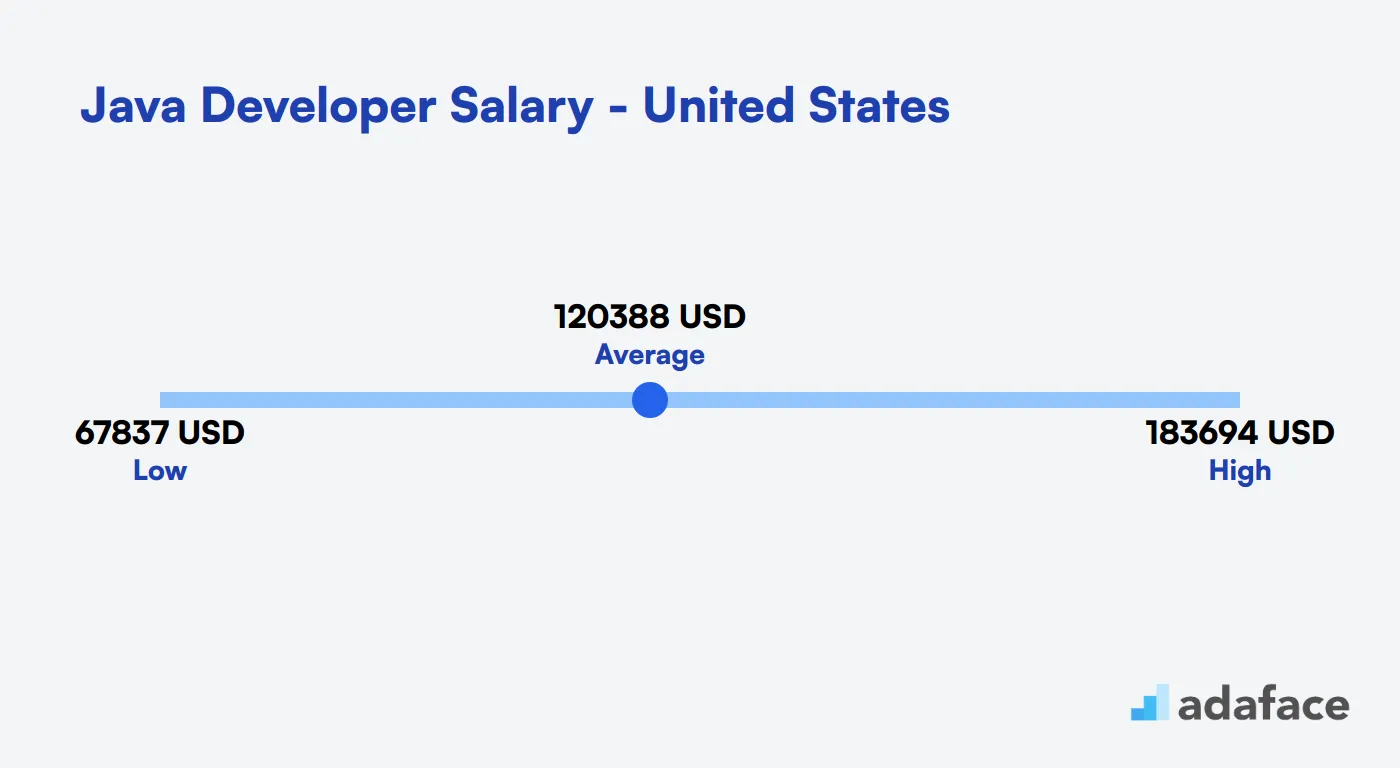
Java Developer Salary in the Philippines
In the Philippines, Java Developer salaries vary based on location and experience. According to recent data, the median annual salary ranges from ₱464,841 to ₱908,005 across different cities. Mandaluyong offers the highest median at ₱908,005, while Manila and Quezon City fall in the middle range at about ₱830,000 to ₱835,000 annually.
The overall salary range for Java Developers in the Philippines spans from ₱183,883 to ₱1,175,081 per year. This wide range reflects differences in skills, experience, and the specific requirements of each role. Recruiters should consider these figures as a starting point and adjust based on the candidate's expertise and the company's budget.
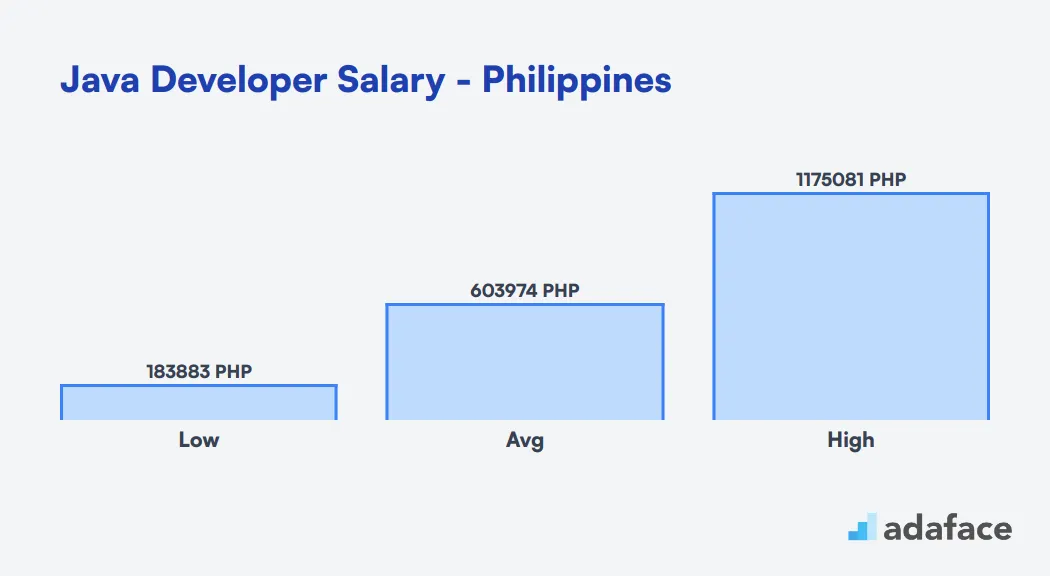
Java Developer Salary in India
In India, the average salary for a Java Developer is approximately ₹772,354 annually. Salaries can vary by location and experience, with the lowest being around ₹273,468 and the highest reaching up to ₹1,435,451. Major tech hubs like Pune and Gurgaon tend to offer the higher end of the salary range.
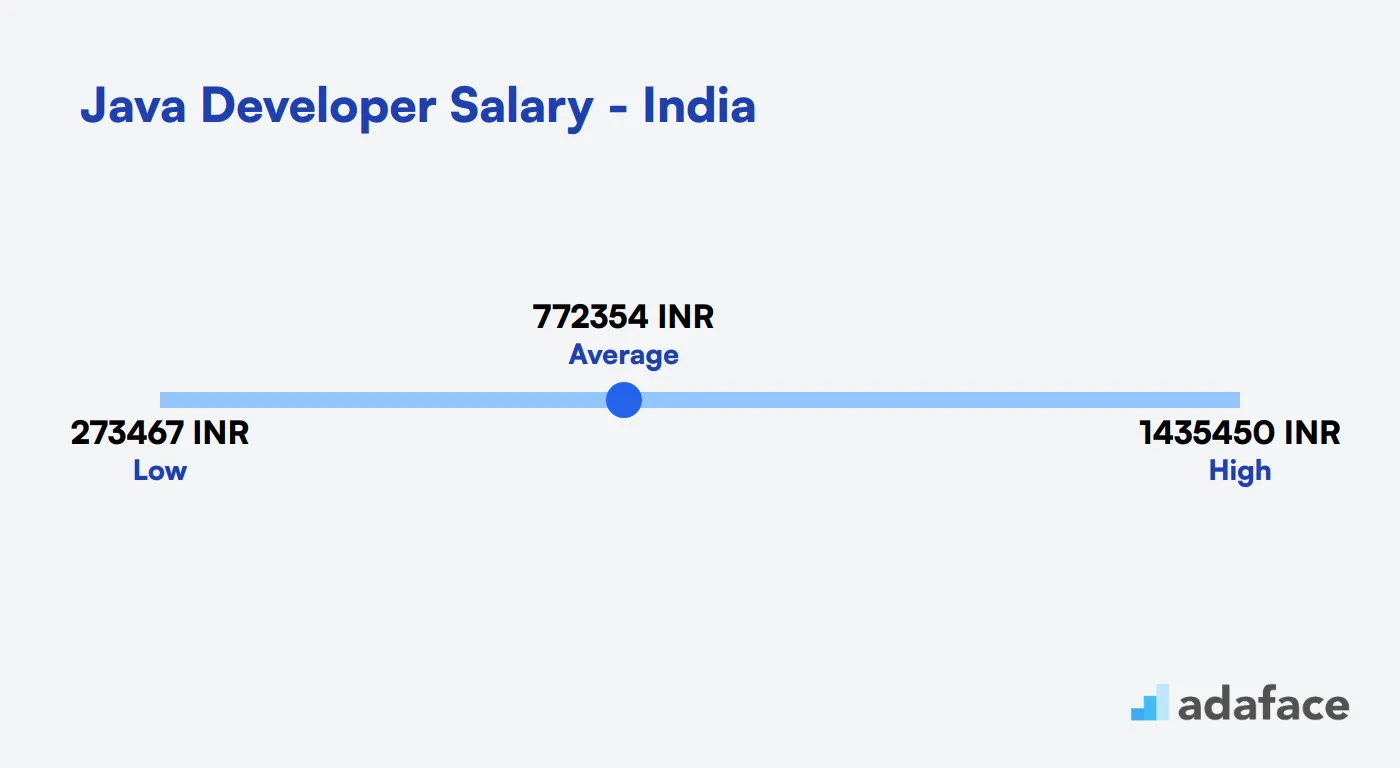
What's the difference between a Junior Java Developer and a Senior Java Developer?
Distinguishing between a Junior and Senior Java Developer can be tricky, as the lines often blur based on individual skills and company standards. The key differences lie in experience, responsibilities, and the depth of technical expertise.
Junior Java Developers typically have 0-3 years of experience and possess basic to intermediate Java proficiency. They work on individual tasks, receive mentoring, and follow established coding patterns. Their focus is on core Java and basic frameworks, with their code often being reviewed by more experienced team members.
Senior Java Developers, on the other hand, boast 5+ years of experience and demonstrate advanced to expert-level Java skills. They take charge of entire projects or modules, mentor juniors, and design system architecture. Their problem-solving abilities extend to complex, system-wide issues, and they're well-versed in advanced Java concepts and multiple frameworks. Senior developers also play a crucial role in conducting code reviews.
While these distinctions provide a general guideline, it's important to note that the specific requirements and expectations may vary across organizations and projects.
| Junior Java Developer | Senior Java Developer | |
|---|---|---|
| Years of Experience | 0-3 years | 5+ years |
| Java Proficiency | Basic to intermediate | Advanced to expert |
| Project Responsibility | Individual tasks | Entire projects or modules |
| Mentoring Role | Receives mentoring | Mentors junior developers |
| Architecture Design | Follows established patterns | Designs and implements architecture |
| Problem-Solving Skills | Solves routine issues | Tackles complex, system-wide problems |
| Technology Stack | Core Java, basic frameworks | Advanced Java, multiple frameworks |
| Code Review | Code is reviewed | Reviews others' code |
Hire the Perfect Java Developers for Your Team
In this blog post, we've walked you through the entire Java developer hiring process. From understanding why you need a Java developer to identifying the key skills and structuring the interview stages, every step has been covered. We've also discussed how to write compelling job descriptions and explored cost considerations.
To ensure you hire top talent, one key takeaway is to use well-crafted job descriptions paired with relevant skills assessments. These tools can significantly improve your hiring accuracy. Consider using Java online tests to evaluate candidates effectively. By focusing on these aspects, you'll be well-equipped to make informed hiring decisions.
Java Online Test
FAQs
In a Java developer's resume, look for keywords like Java SE, Java EE, Spring Framework, Hibernate, and SQL. Experience with REST APIs and microservices is also beneficial.
Implement coding tests and technical interviews to evaluate a candidate's proficiency in Java programming. Use online assessment platforms such as our Java online test for accurate screening.
Recommended skills tests include Java coding challenges, Spring and Hibernate tests, and SQL assessments. These tests help gauge a candidate’s abilities in related areas.
Start with a phone screen to assess communication skills, followed by a technical interview focusing on Java fundamentals and problem-solving. Consider adding a practical coding test or take-home assignment.
Experience with frameworks like Spring and Hibernate is crucial as they are widely used in Java projects to enhance productivity, support code scalability, and improve application performance.
Cultural fit is essential for team dynamics and long-term collaboration. Ensure the candidate aligns with your company's values and work environment to foster a positive and productive workplace.
Offer competitive compensation, emphasize career growth opportunities, and showcase interesting projects. Highlight your company's tech stack and collaborative culture to attract top talent.

40 min skill tests.
No trick questions.
Accurate shortlisting.
We make it easy for you to find the best candidates in your pipeline with a 40 min skills test.
Try for freeRelated posts
Free resources



